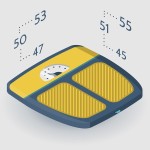WHY A LIFESTYLE CHANGE ISN’T AS DIFFICULT AS IT SOUNDS
By JOANNE HENSON
There’s a motivational Tweet that’s always doing the rounds which says, “It’s not a diet, it’s a lifestyle”. But in my experience, when people want to get healthy and lose weight, they generally choose a quick-fix diet rather than a longer-term lifestyle change.
 If you choose to embark on a quick-fix plan, and manage to stick with it, you’ll see results, but it’s likely that those results will be temporary. Most people put their lives on hold while they chase that smaller dress size, and eventually find themselves drifting back to their old eating habits. Then the weight goes back on again, and the whole cycle starts again.
If you choose to embark on a quick-fix plan, and manage to stick with it, you’ll see results, but it’s likely that those results will be temporary. Most people put their lives on hold while they chase that smaller dress size, and eventually find themselves drifting back to their old eating habits. Then the weight goes back on again, and the whole cycle starts again.
Yo-yo dieting like this damages the metabolism, making weight loss harder every time, so why do we get stuck in such an ineffective cycle?
Although deep down we all know that permanent weight loss and good health can only be achieved through a permanent change in lifestyle, it can sound really daunting if you’re someone who’s always seen weight loss and healthy eating as a form of deprivation. If you’ve only ever reached your ideal weight by reducing the amount of food you eat or by cutting out the foods you love most, doing that forever is never going to sound appealing.
But don’t be put off – a lifestyle change does not mean being on a permanent diet. If you choose the right foods, you shouldn’t need to reduce the quantity (in fact some of my clients have found that they’ve been able to increase the amount they eat). And if you get the basics right, there’ll be no need to cut out the occasional treat either.
Try to get lots of lean protein, good fats, vegetables and fruit and replace sugary, processed foods and refined, white carbs with healthier alternatives. Do this 80-85% of the time, and you can be indulgent with the remaining 15-20% – a couple of glasses of wine, a dessert when you’re eating out, an ice cream on a sunny day.
 You should find that once you’re nourishing your body with good food (rather than punishing it by starving it) it will reward you by giving you more energy and you’ll start to feel more positive, which in turn will make you want to continue with the healthy eating. It will all start making sense and feeling “right”.
You should find that once you’re nourishing your body with good food (rather than punishing it by starving it) it will reward you by giving you more energy and you’ll start to feel more positive, which in turn will make you want to continue with the healthy eating. It will all start making sense and feeling “right”.
But it’s important that you approach it slowly. Make small changes, one at a time. One small change which you can maintain is going to be far more effective than a big change which you can’t maintain, or too many changes all at once. Then give yourself time – good habits take a while to form but bad habits take a while to lose too.
And don’t just cut out the bad habits – replace them with good ones so that you don’t leave a “hole” where a treat used to be. If you always have a couple of biscuits with your morning coffee, have a handful of nuts instead. Or if you’re used to having a side portion of fries when you eat out, don’t just cut them out but order a side portion of something heathier, so you’ve still got the same volume of food in front of you.
I generally ask my clients to introduce just one small change each week. After six weeks, that’s six new healthy habits and they are well on the way to achieving their lifestyle change.
What small change could you introduce this week to get started on your own journey to a healthier body?
Joanne Henson is a health and weight-loss coach, specialising in helping people with a history of failed diets and fitness regimes to change their relationship with food and exercise for good. From unhealthy beginnings she overcame her own obstacles and now motivates and inspires others to become the healthier, leaner, happier people they’ve always wanted to be.
- Joanne is the author of ‘What’s Your Excuse For Not Eating Healthily?’ and ‘What’s Your Excuse For Not Getting Fit?’ Both are available on Amazon in Paperback and Kindle format.
- www.joannehenson.co.uk
- Follow Joanne on Twitter: @Joannemh and @whats_yr_excuse

